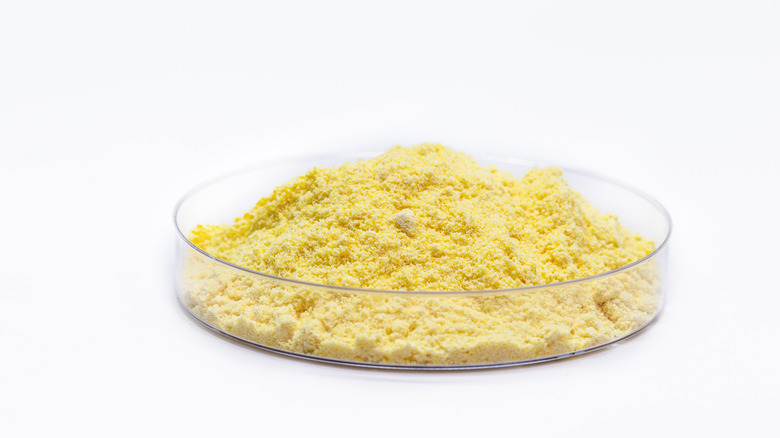This Is What Sulfur Really Does To Your Body
Smelling sulfur is a distinct and unpleasant experience few can forget. It's the smell of rotten eggs or a particularly acrid case of gas. As terrible as sulfur smells, people may assume that it would have seriously negative effects on the body. It's a belief that sulfur's use in matches and pesticides does little to disprove.
But as WebMD reveals, people have little to fear from the kind of sulfur exposure most people face on a day-to-day basis. Sulfur has no known drug interactions and no known side effects at its usual intake levels. And those levels are fairly variable, as the Sulphur Institute explains. There is no current recommended daily intake of sulfur, but it is naturally present in many foods, meaning most people take in sulfur on a daily basis at very low levels.
The Institute goes on to explain that sulfur is integral to the creation of keratin, amino acids, antioxidants, collagen, and insulin. In some cases sulfur is used up in the creation process of another compound, while in other cases sulfur is a building block of something larger, as in the case of antioxidants. This is all in the body, however. When it comes to external exposure, things can be a little bit different.
Sulfur poses little danger
The Sulphur Institute has plenty of information about the internal uses of sulfur. But for external uses, the National Pesticide Information Center had more direct answers. Like other sources on sulfur's effects, the NPIC is quick to assure readers that there is little risk to sulfur exposure. The compound isn't known to cause cancer, whether inhaled or left in contact with the skin. And only prolonged or regular contact with the skin is likely to cause a rash or reaction.
Sulfur's largest danger comes when it is burned, but even then the danger is mild. The process produces sulfur dioxide, which can cause eye irritation as well as coughing, shortness of breath, sore throat, and labored breathing when inhaled. Inhaling unburned sulfur can also cause these issues, but few people are likely to come into contact with that much sulfur unless they are applying it as a pesticide and do not wear a mask or wash their hands afterward.
As the NPIC says, sulfur is found in plants, animals, water, and soil. The Sulphur Institute says that it is the 8th most common element in the human body. And at regular exposure levels, it has little effect on humans and poses very little danger.


